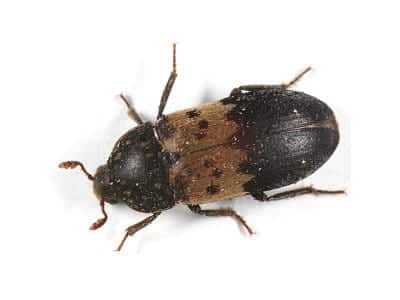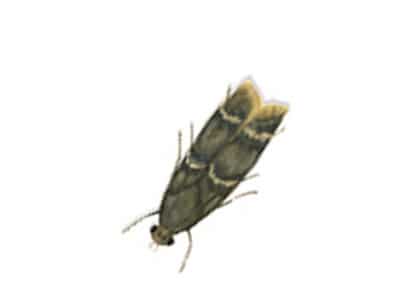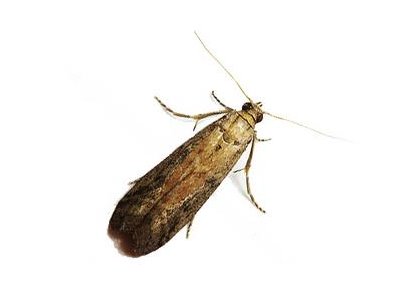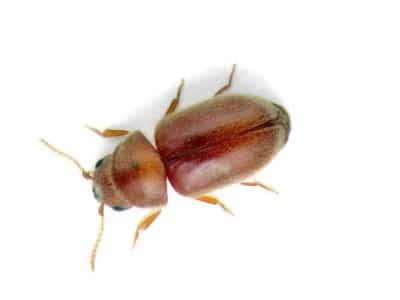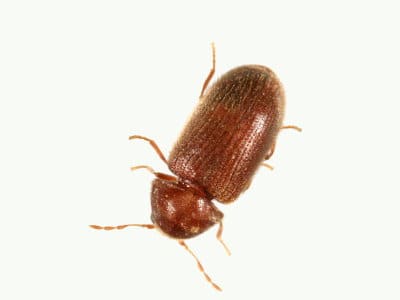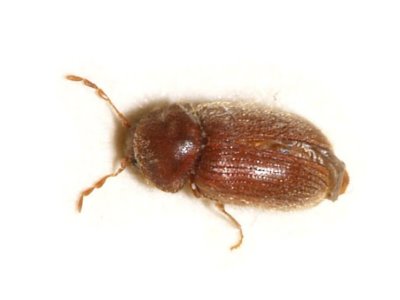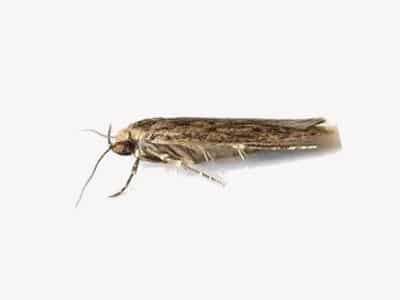About Tropical Warehouse Moths
The tropical warehouse moth (Ephestia cautella) also known as the almond moth, the dried currant moth and the fig moth, is a pest of stored food products. As their many names suggest, this moth species thrives in tropical environments and is commonly found infesting stored food products like flour, bran, oats and other grains, as well as nuts and dried fruits. In the UK, these pests are usually found indoors, primarily in places where food is stored or processed.
Infestation by tropical warehouse moths is often caused by contaminated incoming goods, with the infestation able to spread to other food sources within the same storage area once the adult moths emerge and take flight.
Controlling warehouse moth infestations is important to preserve quality of food to ensure it is fit for consumption, and to prevent loss of food with has negative impacts on business and the environment.
Pest Solutions are here to help with tropical warehouse moth problems. Get the details of your local Pest Solutions Branch here or call our national advice line on 0800 027 2555 to arrange a FREE survey or a service visit.
Identifying Tropical Warehouse Moths
Adult tropical warehouse moths usually grow to around 6mm-10mm in length with wingspan averaging between 14mm-22mm. Adult stages are mostly brown or grey with a fine fringe on the tips of their wings.
Tropical warehouse moth larvae are typically 10mm-15mm long with a creamy-white colouring and a dark head. Close inspection of larvae will show 3 small pars of true legs close to the head, and multiple pairs of prolegs along the abdomen which help them grip and move along surfaces. Larvae also often exhibit small fine dark hairs.
Signs of Tropical Warehouse Moth Infestation
If you notice small, grey or brown moths fluttering around, this could mean you have a tropical warehouse moth infestation. However, in larger warehouses or places with high ceilings, this can sometimes go undetected. As such, pheromone lures are effective to detect infestation by warehouse moths.
You may also notice larval stages or eggs within or around food products or spillages. Other signs include silk webbing or faecal matter within stored food products.
Tropical Warehouse Moth Biology & Lifecycle
The tropical warehouse moth undergoes a complete metamorphosis consisting of four stages: Egg, Larva, Pupa and Adult.
Adult females lay their small, oval shaped eggs on or close to a source of food. Eggs hatch and give rise to larvae, which are small, typically creamy-white coloured caterpillars with a dark head and small, fine, dark hairs. Damage to stored food products is caused by the larval stage as they feed and grow. Tropical warehouse moth larvae are known for spinning silken threads which can encase food sources. Adults do not feed, however will drink water if available.
Once mature, larvae will pupate, normally in dark places like crack and crevices or sheltered areas near to the food source. From here, the nocturnal adult moths will emerge to breed and continue the cycle of infestation. In favourable conditions, these moths can reproduce rapidly causing widespread infestations to occur. As such they are a notorious pest of food storage and processing facilities.
The lifecycle of a tropical warehouse moth from egg to adult can be completed in as little as a few weeks if environmental conditions are favourable.
Tropical Warehouse Moth Behaviour
Tropical warehouse moths are nocturnal in nature, and as such these insects are primarily active during darkness hours. This is another reason why it can be difficult to detect these pests during the day, although they can often be seen flying around lights at night or in darker areas.
The attraction to light is useful as we can use this to monitor for presence of these moths and to check levels of activity. EFK units or light traps can be effective indicators of warehouse moth activity.
While adult moths are not known to feed on or cause damage to stored food products, the larvae are voracious feeders and thus the most destructive stage of the lifecycle. Larvae can tunnel into food sources such as grains, cereals, dried fruits and nuts which causes damage and spoilage. In addition, these larvae are prolific silk spinners, using these silken threads to construct webbing. This webbing serves to protect the larvae and is often used to encase food items causing further damage.
Tropical warehouse moths thrive in warm, tropical environments and are well adapted to endure high temperatures. As such, they are typically found indoors in the UK.
Risk of Tropical Warehouse Moth Infestation
Places such as food storage and processing areas are most at risk of infestation by tropical warehouse moths. These insects can contaminate food sources through the insects themselves, as well as faecal matter and webbing. This can pose a risk to public health if consumed by humans as it can result in illness.
Infested products become contaminated and should be disposed of immediately to prevent the infestation spreading. If not, consumption of these contaminated products can cause illness.
Medium to large infestations can cause damage to a significant amount of stored food products, which has negative financial impact through loss. Preventing food waste is also important for the environment.
Significance of Controlling Tropical Warehouse Moth
Control of tropical warehouse moths is important to protect food quality and safety, to prevent food spoilage and prevent economic loss.
By disposing of infested food products, risk to human health is eliminated however, if large amounts of food product must be disposed of, this is bad for business and the environment.
Controlling Tropical Warehouse Moth Infestations
An integrated pest management approach is required when dealing with tropical warehouse moths. In any case, prevention is better than having to deal with an infestation. Pheromone traps are effective tools for early identification of tropical warehouse moth activity.
Food storage areas and containers should be regularly cleaned and inspected to evidence of moth activity. If activity is discovered, effected products should be removed quickly. Affected areas and adjacent areas should be cleaned and checked to make sure there are no life stages of moths present. Food products should be stored in appropriate sealed containers to reduce the risk of ingress by insects.
Each situation is different. A qualified pest management professional will be able to establish the best course of treatment in each case. This will ensure any insecticide is used safely and appropriately.
Preventing Tropical Warehouse Moth Infestations
To prevent infestation by tropical warehouse moths, food storage, hygiene practices and environmental factors are all important.
Storing high risk foods in suitable, sealed containers will prevent access by stored product insects, which reduces the risk of infestation and contamination. Storing food products at the correct temperature and implementing humidity controls will also reduce the risk of infestation by warehoused moths.
Good cleaning practices including regular, detailed deep cleaning of storage containers and storage areas will also aid in preventing infestation by these insects.
Removal of harbourage points i.e. hiding places for larvae to pupate such as cracks and cervices can also help to prevent warehouse moth issues.
DIY Pest Control for Moths
At home, if you discover these moths flying around then it often means that there is in infestation present. Check all stored food products for signs of infestation and promptly dispose of contaminated materials. Once this has been done, storage containers and storage areas such as cupboards or pantries should be cleaned thoroughly. This can be effective if the infestation is not wide spread and has been discovered early enough.
Risk of infestation can be reduced by good hygiene and proper storage of foods in sealed containers.
When to Call a Professional
For larger infestations, or in commercial settings, professional help is usually required to bring merchant grain beetles under control.
A qualified pest management professional will use their expertise to select the best tools for the job to bring the infestation under control.
Call Pest Solutions to Get Rid of Moths Today!
Pest Solutions have local Branches across Scotland, England, Wales and Northern Ireland. Our expert local techs are at hand to attend today. Call now to get an experienced Pest technician visit and get that Pest problem under control swiftly.
Get the details of your local Pest Solutions Branch here or call our national advice line on 0800 027 2555 to arrange a FREE survey or a service visit.
Find out more about how to get rid of Tropical Warehouse Moths
